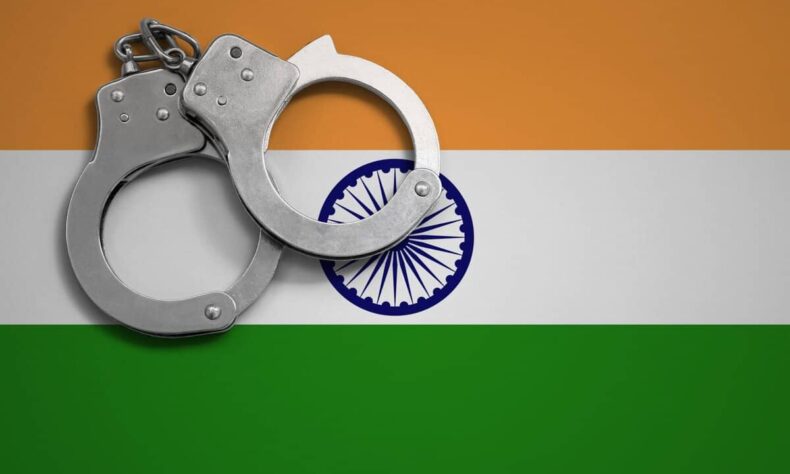
The Prison Statistics India 2023 (PSI 2023), published by the National Crime Records Bureau (NCRB), offers the latest official snapshot of India’s prison system. Although the report covers data from 2023, it is being released only in 2025, reflecting a two-year lag in reporting. The report highlights persistent systemic issues: overcrowding, a majority of undertrial prisoners, and inadequate infrastructure, even as some marginal improvements have occurred since 2022.
As of 31 December 2023, India’s 1,332 jails held 5,30,333 inmates against an authorised capacity of 4,39,119, translating to an occupancy rate of 120.8%. While slightly lower than the 131.4% in 2022, overcrowding remains severe in major urban centres and key states. Delhi, for instance, reported an occupancy rate of 200.2%, followed by Meghalaya (188.7%) and Uttarakhand (183.1%). Undertrial prisoners continue to dominate the prison population, constituting 73.5% of all inmates.
India’s prisons, however, are not merely sites of confinement; they are mirrors reflecting deep social inequities. PSI 2023 provides a detailed look at the demographics of undertrial prisoners, revealing a troubling truth: caste and religion continue to shape the experience of justice in India. When compared with the 2011 Census, stark disparities emerge, suggesting that social marginalisation is systematically reproduced within the criminal justice system.

Religion and the undertrial population
Religion has long been a lens through which social and political inequalities in India are examined. PSI 2023 shows that among India’s approximately 3.9 lakh undertrial prisoners, Hindus account for 72.2%, Muslims 17.7%, Sikhs 3.9%, Christians 2.6%, and “Others” 3.6%. At first glance, these figures may seem roughly proportional to India’s religious demography. A closer look, however, reveals significant disproportions.
The numbers indicate that Muslims, Sikhs, and “Others” are overrepresented. For instance, while Muslims make up 14.2% of India’s population, they comprise 17.7% of undertrial prisoners. Factors can include economic vulnerability, targeted policing in certain regions, and limited access to legal aid. Sikhs, who are 1.7% of India’s population, form 3.9% of undertrials. The “Others” category, which includes smaller religious groups, is also overrepresented—while they make up 2% of the total population, they form 3.6% of undertrials.
In contrast, Hindus are underrepresented at 72.2% compared to their 79.8% population share, reflecting the uneven reach of law enforcement and systemic marginalisation of minority communities.
Social groups and undertrial population
Disparity is also evident through the axis of caste and tribe. PSI 2023 reports that Scheduled Castes (SCs) constitute 20.6% of undertrials, Scheduled Tribes (STs) 10%, Other Backward Classes (OBCs) 35.3%, and “Others”—largely upper castes—25.8%. Comparing these figures with the Census 2011 shows stark disproportions.
OBCs dominate undertrial statistics, especially in Bihar, Uttar Pradesh, Tamil Nadu, and Karnataka, where they make up over half of all undertrials (35.3%). SCs are also overrepresented, comprising 20.6% of undertrials, though they constitute 16.6% of the country’s population. In the states of Punjab and Haryana, they constitute nearly one-third of undertrials, far above their population proportion. Tamil Nadu shows similar trends, possibly underscoring caste hierarchies.
STs, who are 8.6% of the population, form 10% of undertrials. In tribal-majority states such as Jharkhand, Chhattisgarh, and Odisha, STs account for over a quarter of undertrial prisoners. In the North-East, ST undertrials often constitute overwhelming majorities, reflecting both demographics and possible systemic neglect, including a lack of legal representation in tribal languages.


The “Others” category, representing dominant castes, is underrepresented, which can be construed as highlighting how privilege buffers access to bail, legal counsel, and informal support networks.
Reading the numbers together
Caste, tribe, and religion intersect to create double marginalisation. For instance, a Muslim OBC in Uttar Pradesh or an Adivasi in Jharkhand may face compounded disadvantages, reflected in longer pre-trial detention and limited legal access. These figures can be seen as a mirror of structural inequalities in education, employment, and justice access, highlighting that prisons often house society’s failures rather than only those accused of crimes.
Why this matter?
The overrepresentation of Muslims, SCs, STs, and OBCs highlights the need for urgent policy action. According to PSI 2023, legal aid was provided to only 1,93,852 undertrial prisoners, leaving a large proportion without access to mandated legal support. Fast-track courts, while reducing pendency, may perpetuate bias if structural inequalities remain unaddressed. Without robust community-based legal support and awareness, marginalised groups will continue to bear the brunt of an inequitable justice system.
Furthermore, the absence of an updated caste census hampers evidence-based policymaking. Reliance on the Mandal Commission’s 1931-based OBC estimates underscores this gap. A fresh caste census would enable targeted welfare and justice interventions.
Prisons silently reveal who India marginalises. The PSI 2023 report shows that Dalits, Adivasis, OBCs, Muslims, and other minorities constitute the majority of undertrial prisoners, reflecting systemic failure across law enforcement, judiciary, and society. Meaningful reform demands not just procedural change but recognition and redress of structural inequities. Until then, India’s undertrial population will remain a mirror of caste and religious fault lines rather than a measure of crime.
Moumita Barman is a Senior Research Associate at the Centre for Development Policy and Practice (CDPP) in Hyderabad. CDPP is an independent research organisation working to influence public policy with a focus on the development of vulnerable populations.
📰 Crime Today News is proudly sponsored by DRYFRUIT & CO – A Brand by eFabby Global LLC
Design & Developed by Yes Mom Hosting






